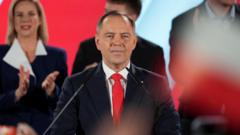Reports indicate a significant rise in anti-Ukrainian sentiment among Polish citizens, with recent incidents highlighting the challenges faced by Ukrainian refugees. The upcoming presidential elections are exacerbating these tensions, as political candidates navigate public opinion on the issue.
Rising Anti-Ukrainian Sentiment in Poland Poses Challenge for Refugees

Rising Anti-Ukrainian Sentiment in Poland Poses Challenge for Refugees
As Poland gears up for elections, a growing sense of hostility towards Ukrainian refugees emerges, threatening communities and public safety.
Reports have surfaced revealing a troubling increase in anti-Ukrainian sentiment among Polish citizens, highlighting the challenges faced by Ukrainian refugees amidst an escalating political climate. Svitlana, a Ukrainian mother residing in Poland, shared her distressing experience when her daughter faced bullying at school, with classmates telling her to "Go back to Ukraine." The shift in atmosphere not only reflects personal stories but a broader societal trend, where many Ukrainians report experiencing abuse in public and online forums.
At least 2.5 million Ukrainians currently live in Poland, accounting for nearly 7% of the population. Initially, the response from Polish citizens was overwhelmingly hospitable, but recent surveys indicate that public support for accepting Ukrainian refugees is diminishing. Notably, a March 2025 poll showed that only 50% of respondents favored such acceptance, a stark decline from 81% two years prior.
Activist Natalia Panchenko from the ‘Stand with Ukraine’ Foundation remarked on the rising xenophobic sentiments, stating that her organization has recorded an increase in online abuse as well as in-person incidents targeting Ukrainians. This sentiment correlates with the current political climate in which candidates are increasingly reluctant to express pro-Ukrainian stances. Notably, the front-runner for presidency, Rafal Trzaskowski, has downplayed his pro-Ukrainian credentials to appeal to centrist voters, reflecting a shift in public attitudes.
The anti-Ukrainian narrative has been further fueled by misinformation campaigns, many of which originate from pro-Kremlin channels. This propaganda suggests that Ukrainians are exploiting Polish resources, a notion that has been echoed in various public discourses. Michal Marek, who monitors disinformation, pointed out that such narratives contribute significantly to the growing divide between Polish citizens and the Ukrainian refugee community, and a clearer picture of these attitudes may emerge post-elections.
As tensions rise, the wellbeing of Ukrainian refugees becomes an increasingly pressing concern, necessitating immediate awareness and action from both the Polish government and local communities.






















